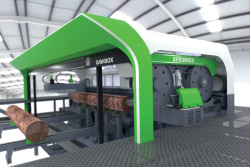Congolaise Industrielle des Bois (CIB) and the Tropical Forest Trust (TFT) announced that the major timber company has more than doubled the amount of certified rainforest it operates in the Congo Basin, creating the largest ever tract of contiguous certified tropical forest in the world, a total of 750,000 ha. To meet the standards for obtaining the approval from the Forest Stewardship Council (FSC), CIB drew on the expertise of staff at the TFT, a Geneva-based nonprofit international charity that seeks to work with industry to transform trade in timber into a force for forest conservation.
TFT was instrumental in helping CIB meet the needs of the Pygmy communities in the Congo Basin, noted Robert Hunink, Executive Vice President of the DLH Group, and President of the Supervisory Board of CIB. “The TFT, along with other partners, provided us with technical guidance and access to new technologies, including a handheld mapping device that has made it possible for the Pygmy communities to communicate to us the specific forest resources that they hold sacred. Such activities, backed by the commitment and dedication of CIB’s management and staff, have been essential in our efforts to obtain certification.
“Under often challenging circumstances, our CIB colleagues and their partners, have achieved what many in the industry have long thought impossible, while maintaining the exceptionally high FSC standard throughout a series of robust audits.”
CIB, a subsidiary of the Danish DLH group, was awarded its most recent FSC certificate for lands the company operates in the Pokola rainforest in Congo-Brazzaville. This region represents the second of CIB’s four forest areas to be certified by the FSC, which first recognised the timber company in 2006, when it certified 297,000 ha of CIB land in the Kabo rainforest. Together the certified area now covers almost 750,000 ha of natural tropical forest managed by CIB in the northern part of Congo-Brazzaville, a region that is home to thousands of indigenous peoples, as well as the forest elephant and communities of gorillas and chimpanzees.
CIB has been working towards FSC certification throughout its entire concession since 2004, partnering with TFT for technical advice and guidance on sustainable forest management. The partnership between TFT, CIB and others has largely focused on the development of new techniques for consultation, conflict resolution and benefit sharing with the indigenous people that live throughout the forest concession.
“I think the CIB approach is a living breathing example that timber production does not have to be synonymous with the destruction of tropical forests,” said Scott Poynton, TFT’s Executive Director. “What we hope to demonstrate with our work in the Congo and elsewhere is that there are rewards for companies that do things the right way. Now it is up to consumer markets to respond to this increase in availability of FSC products and chose sustainably produced wood product over those from dubious origins.”
One of the innovative techniques developed during this partnership, focused on participatory mapping. Using icon-based, Global Positioning System (GPS) units designed for non-literate people, the semi-nomadic Pygmies living within the forest concession walk through their forest and locate resources or areas of significance. For instance, at a large Sapelli tree prized for its edible caterpillars, or an important collecting area for medicinal plants, they simply select the appropriate icon and the GPS records the location. This data forms the basis for resource maps, which bridge the communication gap between the people in the forest and the forest company and enable a fair negotiation.
“Through working with CIB, we have had the chance to develop and implement innovative techniques for sustainable forest management, and the outcome, as we see with the awarding of CIB’s 2nd FSC certificate, is positive – these techniques really work. But CIB is just the start. Forest destruction in the Congo Basin continues at an alarming rate and we need to find new mechanisms for scaling up,” Poynton said.
In order to ensure this trend continues, TFT is launching the Centre of Social Excellence (CSE) for the Forests of the Congo Basin – a new project within TFT’s Climate Tree initiative, designed to address issues related to deforestation and its implication for the communities of local and indigenous people who live in the world’s second largest area of contiguous tropical forest.
The Centre of Social Excellence will focus on improving the understanding and linkages between forestry companies and indigenous communities, thereby encouraging dialogue and sustainable forestry management practices. The CSE initiative offers a unique one-year program for recent graduates of central African universities to develop expertise with innovative techniques for practicing sustainable forest management in the Congo Basin. As forests in the Congo Basin are home to communities and indigenous people, responsible forest companies must integrate techniques that incorporate the views and rights of indigenous people living in and around forest concessions to achieve the recognition of FSC certification for sustainable forest management. The €1.6 million project has been granted key support from the Prince Albert II of Monaco Foundation.
The CSE will offer recent graduates of central African universities, among them anthropologists, economists and sociologists, an opportunity to become experts in forest management. Studying a broad range of social, ethnographic and forestry management topics including TFT-developed participative mapping techniques, the one-year program will be taught both in the classroom and during practical field-based training. The young professionals will apply their knowledge and skills throughout the forests of central Africa.
“Through this programme, TFT will support the development and expansion of expertise among professionals working in central Africa and wishing to practice sustainable forestry,” Poynton said. “The new Centre of Social Excellence planned to be based in Congo-Brazzaville, will make sure that TFT’s positive impact for people and forests can continue to expand, and that companies such as CIB will always have experts to turn to when they want to do the right thing.”
The Congo Basin is a 1.8 million km² tropical forest that sprawls across six countries and is the world’s biggest tropical forest outside of the Amazon. The region that contains the world’s 2nd largest (after the Amazon) contiguous expanse of tropical rainforest loses about 4 Mha each year due to the effects of poverty, population increase, illegal logging, mining, poor forest management and conversion of forest land to agriculture. Conserving the forests of Congo Basin, by reducing the rampant deforestation, is an essential component of mitigating climate change.
Currently an estimated 20% of annual greenhouse gas emissions come from deforestation.
Congo Basin forests support over 400 mammal species, 1,300 bird species, 336 amphibian species, 400 reptile species and 20,000 inventoried plant species of which approximately 8,000 are endemic. The forests are the only home of many great ape species such as the Eastern and Western gorillas, the Bonobo and the Central and Eastern Chimpanzee. These species are being targeted by the burgeoning bush meat trade while accelerating deforestation poses a threat to the functioning of the forest ecosystem as a whole. The forests are also home to thousands of indigenous semi-nomadic forest dwelling people e.g. the Mbendjele Pygmy communities of northern Congo, whose rich knowledge of the forests is disappearing as uncontrolled exploitation displaces them from their forest home.
TFT is working in the Congo Basin (specifically in Cameroon, Republic of Congo and Gabon) on projects covering over 2 Mha. Through encouraging sustainable forest management, TFT promotes an economically viable alternative to deforestation.






